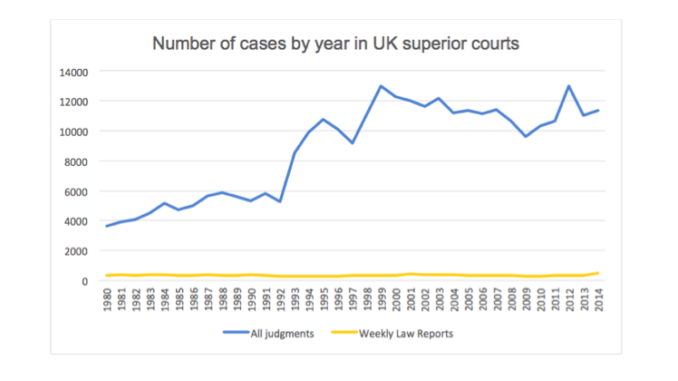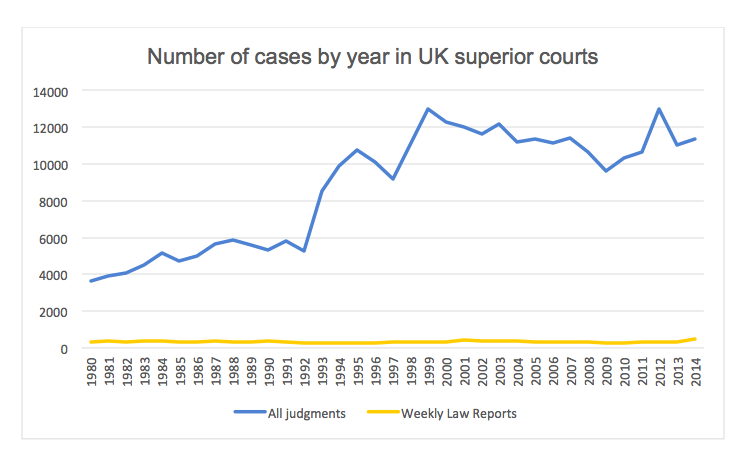
Access, Ignorantia and Artificial Intelligence
By Dr. Matthew Terrell, at legal information company, Justis
Access to justice is an important and current topic and one that cannot be resolved overnight. For example, the increasing amount of superior court cases being heard in the UK (see graph below) creates a large and growing question of access to case law, not only for the public but also practitioners.
In regard to the public’s access to case law, simply enabling access to vast online libraries of documents is unlikely to provide the desired result. When the public cannot access case law they have no way to know the precise status of the law, yet when they do have access to the law, do they understand how to interpret and comprehend the nuances of law?
For practitioners, who do understand how to navigate and interpret the law, there can still be an issue of access, alongside the intensive task of navigating hundreds of years of judgments that is constantly updating.
However, as we know, ignorantia juris non excusat [ ignorance of the law is no excuse ], which applies to both the public and practitioners. As part of the wider discussion it is therefore imperative to consider the importance and value of expertise when attempting to understand a point of law. It is also important to consider the role of technology in supporting better access and accessibility for practitioners and the public.

Access, Accessibility and Artificial intelligence
As ignorance of the law is not an excuse, a lawyer will still need to spend many hours, if not days, searching the mass of case law to find the answers to their client’s questions. Even then there is the question of if they have considered all relevant sources and identified all relevant cases. The solution? Artificial intelligence. More specifically, machine learning.
As Robin Chesterman, Head of Product for Justis, explains: ‘Access to any legal information needs to be complemented by tools to help people make sense of it. Having access to a document is not the same as knowing how to navigate or search that document for the important information or knowing how that document relates to other documents.’
‘That’s why we are using machine learning to cluster and categorise case law and legislation to help our customers navigate the millions of cases available to them. This branch of AI also enables us to identify the relationships between cases, effectively mapping the network of citations that link cases together, to help practitioners find important precedents and cases to support their argument in a fraction of the time it would take to read all subsequent judgments,’ he adds.
When the network of citations is mapped it becomes possible to present the relationships between cases in a variety of ways, such as through creating visualisations which interpret these relationships.
Better access through legal technology
While computers can conduct a large number of tasks in a short amount of time, interpretive tasks are still best left to experts, such as determining case treatments.
This interpretive skill is not something that machines can master with 100% accuracy, and it is therefore important that technology and people work together to transform judgments into rich interactive pieces of content that are easier to navigate and understand.
Together, artificial intelligence, access and accessibility, can co-exist, and this ‘AAA’ approach is a step in the right direction for better resources for both legal practitioners and the public.
However, while technology can provide us with the ability to conduct repetitive and labour-intensive tasks more efficiently, it is imperative we do not forget the value added by legal practitioners, such as lawyers and barristers.
P.S. Justis is also holding a writing competition, check out the details below:
Law and Technology Writing Competition 2019
Effective and persuasive writing is an important skill for students to develop before entering the workplace. The Justis International Law & Technology Writing Competition provides students with a platform to demonstrate their writing ability to an international audience.
Justis is launching this competition for a second year and offer students an opportunity to stand out as someone highly capable of producing excellent content. This year there is a range of exciting new topics from external partners, impressive prizes including a grand prize of £2,000, and a panel of expert judges from around the world.
Last year’s winning and best in category articles were globally received and published in influential publications including New Zealand Bar Association’s At the Bar Magazine, Legal Information Management, and here on Artificial Lawyer.
The overall winner was Roisin Costello from Trinity College Dublin, and the three runners-up were Patrick Alexander Hum from the London School of Economics, Secil Bilgic from Harvard University and Jae Jun Kim from the University of Auckland.
You can find more details here.
1 Trackback / Pingback
Comments are closed.